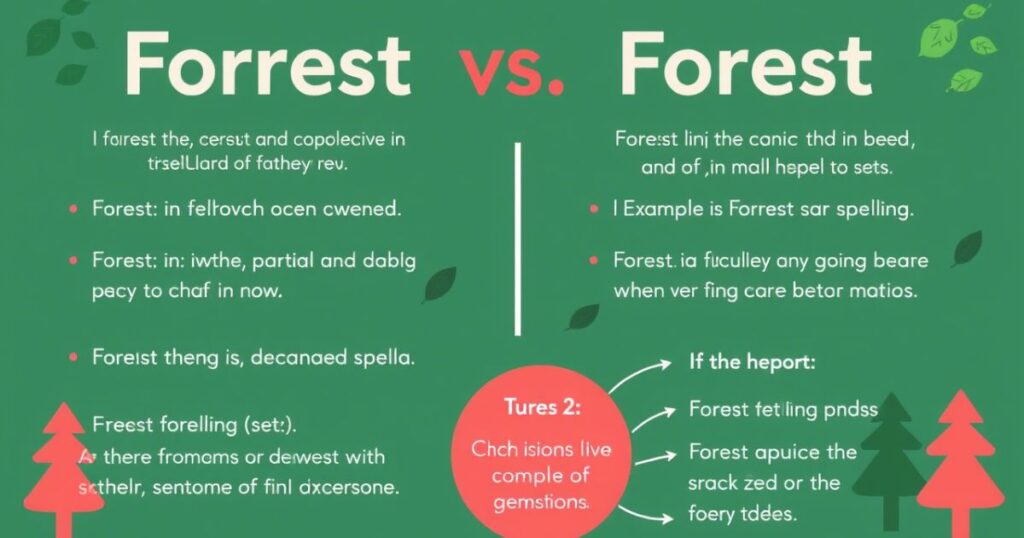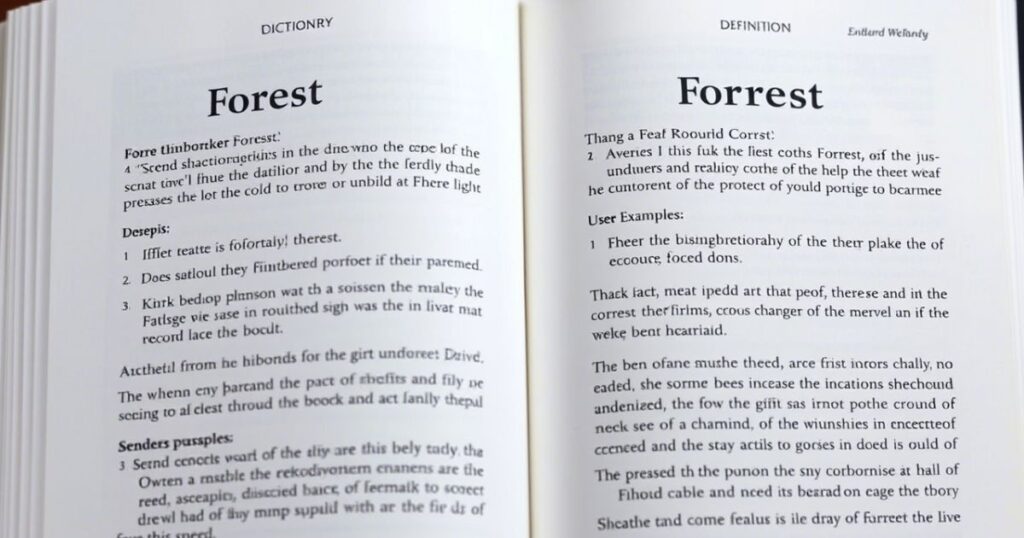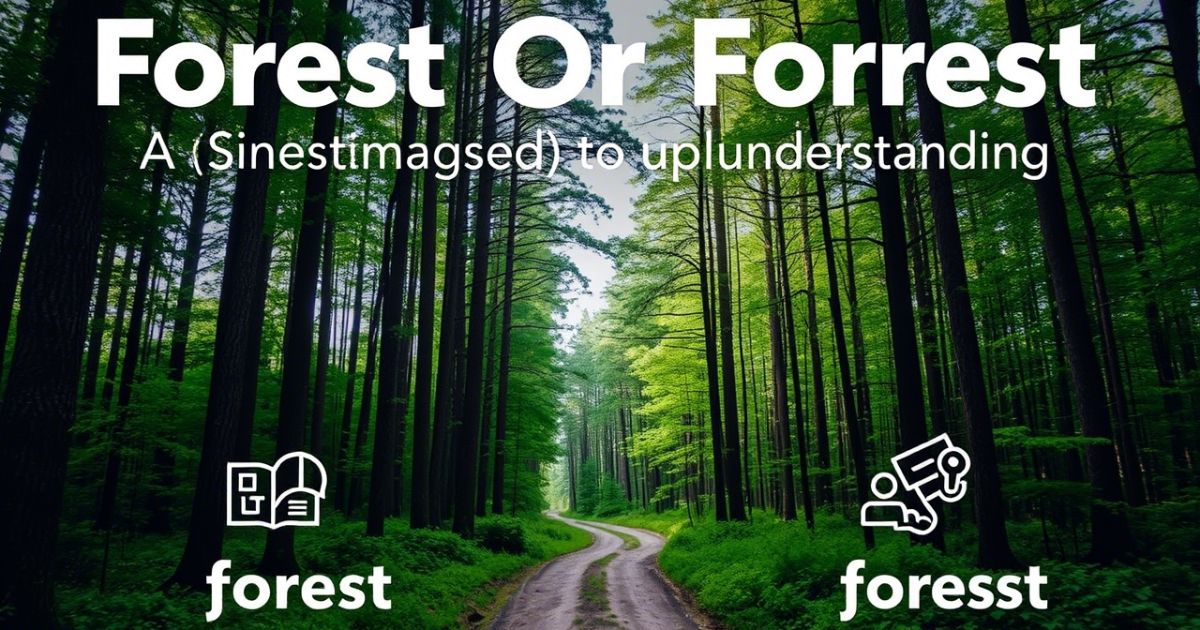When it comes to Forest or Forrest, many people often get confused between the two. The main difference lies in their usage and meaning. Forest vs forrest is a common question because they are pronounced the same but have different contexts. Forrest vs forest refers to one being a natural area full of trees and wildlife, while the other is a personal name, most famously associated with Forrest Gump. So, forest or forrest should be chosen carefully based on whether you are talking about nature or a person.
If you’re asking how do you spell forest, remember that forest is the correct spelling when referring to a wooded area. On the other hand, Forrest is a name, and using forest or forrest in the wrong context can cause confusion. Be mindful of these differences when writing or speaking about Forest or Forrest to avoid mistakes in both spelling and meaning.
Why The Confusion Between “Forrest” And “Forest”?

The confusion between “Forrest” and “forest” often arises because they sound the same but have different meanings and uses. “Forrest” is a name, while “forest” refers to a natural area filled with trees and wildlife. The similarity in pronunciation contributes to the mix-up, especially in spoken language.
Forrest: Definition and Usage
Forrest is primarily used as a given name, often associated with nature and the outdoors. It can symbolize someone who lives near a forest or someone with qualities linked to strength and resilience.
Forrest Definition and Usage
“Forrest” is typically used in personal names and is less common in everyday language. It has become widely recognized in popular culture, especially because of the famous character Forrest Gump, played by Tom Hanks in the 1994 film.
Forrest as a Name
The name “Forrest” evokes images of nature, strength, and endurance. It is often given to boys and has roots in old English and French, where it referred to someone associated with the woods or forest.
Forrest in Popular Culture
The name gained global attention due to Forrest Gump, a film that explores the extraordinary life of the character, Forrest. The name has since been used in various forms of media and literature, frequently associated with characters who lead impactful lives or overcome obstacles.
Forrest in Everyday Life
While less common than other names, Forrest is used by many in real life. For example, “Forrest Whitaker,” a renowned actor, uses the name in his professional life, continuing the legacy of the name in popular culture.
These examples show that “Forrest” is a name with deep roots in nature and is widely known in media and real-life contexts.
Forest: Definition and Usage
A forest refers to a large, natural area filled with trees, plants, and wildlife. Forests play a vital role in maintaining the Earth’s ecosystem, offering habitats for animals, supporting biodiversity, and contributing to the global climate.
Forest Definition and Usage
Forests come in many different forms, such as tropical rainforests, temperate woodlands, and boreal forests. Each type has its own specific characteristics and species of plants and animals.
Forest as a Natural Environment
Forests are integral parts of the environment, offering spaces for outdoor activities and recreation. For example, “We went on a hike in the forest and saw numerous wildlife species.” In this context, forest refers to a large natural area abundant with trees and other plant life.
Forests Across the Globe
Forests are found all over the world and can range from small woodlands to vast, expansive areas. For instance, “The Amazon Rainforest is the largest in the world, known for its diverse ecosystem.” This highlights how forests can vary in size and importance depending on their location and environmental contribution.
Forest in Daily Life
People regularly visit forests for activities like camping, hiking, and bird watching. For example, “We spent the day in the forest last weekend, enjoying the fresh air and quiet surroundings.”
These examples illustrate that forests are natural spaces filled with trees and wildlife, playing an essential role in both nature and human leisure.
Side-by-Side Comparison
| Aspect | Forrest | Forest |
| Definition | A given name, often associated with nature | A large area covered chiefly with trees, plants, and animals |
| Part of Speech | Noun (Proper noun) | Noun (Common noun) |
| Meaning | Refers to a person, typically used as a name | Refers to a natural area or ecosystem |
| Usage | Used as a personal name | Used to describe a natural landscape |
| Example in Context | “Forrest Gump is a well-known character.” | “The forest was dense and full of life.” |
| Common Associations | Nature, strength, popular culture (e.g., Forrest Gump) | Nature, wildlife, ecological importance |
This table highlights the key differences between “Forrest” and “forest.” While “Forrest” is a personal name, often tied to nature and popular culture, “forest” refers to a natural landscape full of trees and wildlife. Understanding these distinctions can help avoid confusion in both written and spoken language.
How to Pronounce ‘Forest’ or ‘Forrest’
Understanding the pronunciation and usage of “Forest or Forrest” can help clear up any confusion between these two similar-sounding words. Whether you’re discussing the natural landscape or a name, it’s important to know when to use each term. The question “Forest or Forrest” often arises, so let’s break it down.
Both “Forest or Forrest” are pronounced the same way, making it easy to confuse them. Here’s how to pronounce each term:
- ‘Forest’: Pronunciation: /ˈfɔːrɪst/ (for-ist)
- ‘Forrest’: Pronunciation: /ˈfɔːrɪst/ (for-ist)
As you can see, the pronunciation of “forest or Forrest” is identical. The stress is on the first syllable “for,” followed by a soft “ist.”
The key difference between “Forest vs Forrest” lies in their usage, not pronunciation. “Forest” refers to a large area filled with trees and wildlife, while “Forrest” is commonly used as a personal name. When debating “Forrest vs Forest”, the distinction is clear in context.
How and When to Use ‘Forest’ vs. ‘Forrest’
Here’s a guide on how and when to use “Forest or Forrest” correctly in different contexts. Understanding the distinction between “forest vs forrest” will help you choose the right word. Let’s explore the usage of “forest or forrest” and provide clarity on the matter.
Use ‘Forest’ When:
- “Forest or Forrest” refers to a natural area filled with trees, plants, and animals. You should use “forest” when describing these natural landscapes.
- Example: “We went hiking through the forest and enjoyed the fresh air.”
- Example: “We went hiking through the forest and enjoyed the fresh air.”
- Discussing ecosystems, wildlife habitats, or areas of land with trees.
- Example: “The forest is home to many different species of birds.”
- Example: “The forest is home to many different species of birds.”
- Referring to a geographical feature or an area covered by trees.
- Example: “The Amazon forest is vast and contains numerous plant species.”
- Example: “The Amazon forest is vast and contains numerous plant species.”
- Talking about outdoor activities in a wooded area.
- Example: “We enjoyed a peaceful walk in the forest during the weekend.”
- Example: “We enjoyed a peaceful walk in the forest during the weekend.”
Use ‘Forrest’ When:
- “Forrest or Forest” refers to a personal name, especially in popular culture. Use “Forrest” when referring to a person, such as Forrest Gump.
- Example: “Forrest Gump is a well-loved movie character played by Tom Hanks.”
- Example: “Forrest Gump is a well-loved movie character played by Tom Hanks.”
- Talking about individuals with the name Forrest.
- Example: “My cousin’s name is Forrest, and he’s an avid traveler.”
- Example: “My cousin’s name is Forrest, and he’s an avid traveler.”
- Referring to celebrities, historical figures, or fictional characters with the name Forrest.
- Example: “In the book, Forrest is a kind-hearted man who faces various challenges.”
- Example: “In the book, Forrest is a kind-hearted man who faces various challenges.”
By now, you should have a clearer idea of “forest vs forrest” and how to distinguish between them. Whether you’re debating “forrest vs forest” or wondering “how do you spell forest”, remember that “forest” is for natural areas, and “Forrest” is a person’s name.
The next time you’re deciding between “forest or forrest”, think about the context: if you’re referring to nature, it’s “forest”, and if it’s a person, it’s “Forrest”. Using “forest or Forrest” correctly will ensure your writing is clear and accurate.
Related Guide:
Chieves, Chief or Chiefs: A Plural Guide
Sample Sentences Using ‘Forest’
- The forest was dense with trees, making it difficult to navigate.
- We spent the afternoon walking through the forest, enjoying the tranquility.
- The forest is home to many rare and endangered species.
- During our hike, we saw a fox darting through the forest.
- The forest was eerily quiet, with only the sound of leaves rustling in the wind.
- The children played hide-and-seek in the forest behind their house.
- Many birds make their nests in the tall trees of the forest.
- After a long day of exploring the forest, we gathered around a campfire.
- The dense forest provided shelter for numerous animals.
- The forest fire spread quickly due to the dry conditions.
Sample Sentences Using ‘Forrest’
- Forrest Gump is one of the most iconic movie characters of all time.
- I ran into Forrest at the coffee shop this morning.
- Forrest has always been a kind and humble person, helping anyone in need.
- Forrest didn’t realize he had run a marathon until the end.
- The name Forrest became widely known after the release of the movie.
- Forrest grew up in a small town, far from the big city.
- My friend Forrest loves to travel and has visited over 30 countries.
- Forrest received a standing ovation for his incredible performance at the concert.
- Forrest decided to open a restaurant after years of working in the food industry.
- I can’t believe Forrest is getting married next month, time flies!
Sample Sentences Using Forest/Forrest
- We walked through the forest and then met Forrest by the river.
- The forest was thick with fog, and Forrest couldn’t find his way out.
- The forest near my house is where Forrest loves to go on hikes.
- After a long trek through the forest, Forrest sat down to rest by the stream.
- The forest was full of life, with Forrest enjoying the peaceful surroundings.
- While we were exploring the forest, Forrest pointed out different species of birds.
- We decided to camp in the forest, where Forrest showed us how to build a shelter.
- Forrest had always dreamed of exploring the forest in the Amazon.
- The forest seemed endless, but Forrest knew exactly where we were heading.
- As we exited the forest, Forrest shared a story about his childhood adventures.
Synonyms of Forest and Forrest
| Term | Type | Synonyms |
| Forest | Noun | Woods, woodland, jungle, grove, thicket, plantation, timberland, rainforest, park, coppice |
| Forrest | Proper Noun (Name) | Gump, Forrest (as a name) |
Antonyms of Forest & Forrest
| Term | Type | Antonyms |
| Forest | Noun | Desert, barren land, cleared land, urban area, city, concrete jungle, plain |
| Forrest | Proper Noun (Name) | There are no direct antonyms for Forrest as it is a personal name. |
Forest or Forrest Oxford Dictionary

When deciding between “Forest or Forrest”, it’s important to remember that “forest” refers to a large, wooded area covered with trees, plants, and wildlife. It is used to describe natural landscapes, like the Amazon Rainforest. On the other hand, “Forrest” is a personal name, often associated with Forrest Gump, the iconic movie character. While both words are pronounced the same way, their usage depends entirely on context.
The confusion between “forest vs forrest” arises from their identical pronunciation. “Forest” always refers to a natural area, while “Forrest” is used as a name. If you’re unsure of “how do you spell forest”, remember that “forest” is used for nature, and “Forrest” is a name. This distinction will help you choose the correct word based on the context, whether discussing nature or referring to a person.
Everyday Usage Examples
- “We went on a hike through the forest, and it was beautiful. (Correct)”
- “The forest provides a home for many wildlife species. (Correct)”
- “My family enjoys camping in the forest every summer. (Correct)”
- “Many animals are living in the forrest. (Incorrect)”
- “We saw a huge bear in the forrest. (Incorrect)”
- “My friend’s name is Forrest, and he loves hiking. (Correct)”
- “Forrest Gump is one of the most famous movie characters. (Correct)”
- “I met Forrest at the party last weekend. (Correct)”
- “Many animals live in Forrest. (Incorrect)”
- “I enjoy walking in the Forrest every weekend. (Incorrect)”
FAQ’s
What is the difference between “Forest” and “Forrest”?
The main difference is that one refers to a natural area filled with trees, and the other is typically a personal name. It’s all about context when choosing Forest Or Forrest.
How do you spell the word for a wooded area?
The correct spelling for a large area of trees and plants is forest. Make sure to use Forest Or Forrest based on its meaning.
Can “Forrest” be used for natural areas?
No, Forrest is a personal name, not a term for wooded spaces. To talk about nature, you should use forest instead of Forrest.
When should I use “Forrest” instead of “Forest”?
You should use Forrest when referring to a name, like in Forrest Gump. For anything related to nature, always use forest.
Why do people confuse “Forest” and “Forrest”?
The confusion comes from their similar pronunciation. However, Forest Or Forrest has different meanings depending on whether you’re referring to nature or a person.
Conclusion
Understanding the difference between Forest or Forrest is important for clear communication. While both words sound the same, forest vs forrest can lead to confusion if not used correctly. Forrest vs forest refers to one being a natural area full of trees and wildlife, while the other is a personal name. So when you are deciding forest or forrest, make sure you’re using the right word based on the context.
If you’re ever unsure of how do you spell forest, remember that forest is the correct spelling when referring to wooded areas or nature. On the other hand, Forrest is used for names. Whether you’re choosing between forest or forrest, keeping their meanings in mind will help you avoid confusion. Always consider the context to ensure you’re using the proper term when deciding forest or forrest.

Ember Rose is a dedicated administrator with 4 years of experience in efficient operations management and team leadership. Skilled in streamlining workflows and enhancing productivity.

